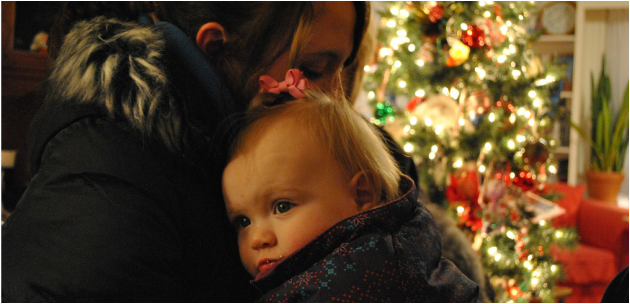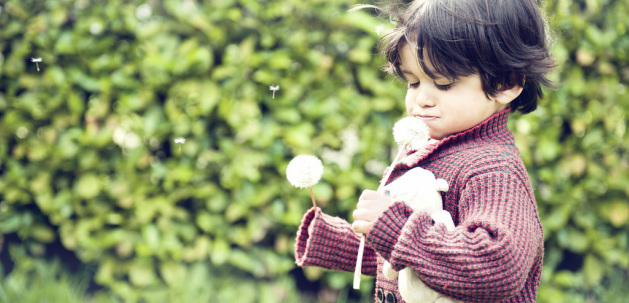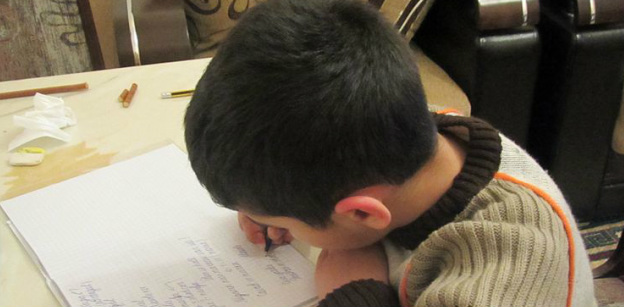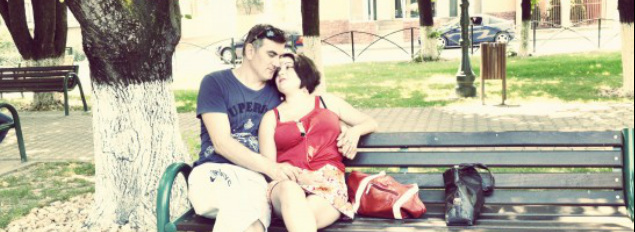|
—A Christmas adaptation of 1 Corinthians 13
If I decorate my house perfectly with holly, strands of twinkling lights, and shiny balls, but do not show love, I’m just another decorator. If I slave away in the kitchen, baking dozens of Christmas cookies, preparing gourmet meals, and arranging a beautifully adorned table at mealtime, but do not show love, I’m just another cook. If I work at the soup kitchen, sing carols in the nursing home, and give all that I have to charity, but do not show love, it profits me nothing. If I trim the tree with shimmering angels and crocheted snowflakes, attend a myriad of holiday parties, and sing in the choir’s cantata, but do not focus on Christ, I have missed the point. Love stops the cooking to hug the child. Love sets aside the decorating to kiss the husband. Love is kind, though harried and tired. Love doesn’t envy another’s home that has coordinated Christmas china and table linens. Love doesn’t yell at the kids to get out of the way, but is thankful they are there to be in the way. Love doesn’t give only to those who are able to give in return, but rejoices in giving to those who can’t. Love bears all things, believes all things, hopes all things, endures all things. Love never fails. DVDs will get scratched, toys will be forgotten, scarves and hats will be lost, a new PC will become outdated, but the gift of love will endure. Courtesy of Activated! magazine. Used by permission. Photo: Krystine Lovett via Flickr
0 Comments
By Renee Chang None of her friends or family understands why she has done it, and most of them would like to shake her out of her foolishness. Their objections make sense. After all, May is in her mid-forties and has been living alone ever since her daughter moved out. May is also in debt. And yet, here she is, raising her ex-husband’s child by another woman. May married early and was divorced by her early twenties, but even before that, she had been raising her first child alone, as her ex-husband had a drug addiction and spent as much time in prison as out. Then twenty-some years later, he reappeared out of the blue and asked for a favor. He had fathered a new baby with another woman, and he wanted May to arrange for the baby to be taken into an orphanage before he went to jail again. Little Joline had been abandoned by her mother, and it seemed she was destined for a childhood spent in an institution. Instead of that, May arranged to keep the baby and has been raising her for the past five years. It hasn’t been easy. May is working hard to make ends meet, and Joline is a handful. But May is undeterred. “People have been telling me what a big burden Joline is, and how she isn’t worth the sacrifices I make to look after her. But no one ever asks me how I feel or really listens to why I’m doing this. “After my last failed relationship, I felt I had lost everything to live for and that I’d never have a normal family. But when I first saw Joline’s smile and felt her little hand clasp one of my fingers, I knew then that there was someone who loved me and needed me. Joline is not a burden, she’s my source of love and joy.” Just then, Joline came over and placed her arms around May’s neck and kissed her cheeks. “I love you, Mommy. You’re the best in the world!” May’s face lit up as the proud mother she is. It dawned on me then. May was right, even though others had misjudged her. Rather than letting life’s misfortunes and struggles drag her into a spiral of self-pity, she had chosen to focus on giving what she still had. And in doing so, she also found the happiness that had been eluding her. Article originally published in Activated! magazine. Used with permission. Photo by Wilson Corral via Flickr.
Linda and Richard Eyre, Teaching Children Joy Adults often bristle when someone remarks that they are “just like so-and-so.” We like to think of ourselves as unique, different, and one-of-a-kind, which is how it is meant to be. It is good to remember that there is much more to what makes a person a unique individual than, for example, the obvious characteristics of a person’s astrological sign, their interests, the number of children they have, or the type of clothes that they wear. In a similar fashion, parents should learn to appreciate the uniqueness that each child brings to their lives. Each child needs to feel special and important in his or her own right. Seeing each child as an individual with varying likes and dislikes, will help to make the child feel loved for who he is and is meant to be. Here are some tips on how we can encourage our children’s unique qualities and characteristics:
Ponder: Take time to reflect on each of your children’s qualities and strengths. Make a list of these qualities and focus on encouraging and praising your children for them. Text courtesy of Motivated magazine. Used with permission. Photo by Patrick via Flickr.
Let me know when I make you proud. And help me to have pride in my own accomplishments. Let me earn your trust. Then trust me. I won’t let you down. Let me try my wings. If I fail, let me know it’s okay, and encourage me to try again. Let me know you love me—with a hug, or a pat on the back. Or, when I need it, with a firm but gentle “no.” Let me be. Let me change. Let me grow. Let me tell you when I’m feeling bad... or angry… even at you. Let me know that even on my worst days, you still like me. Let me dream. Share my joy when my dreams come true. Share my tears when they don’t. Let me feel secure in my home. Help me realize that love is always there … that I can depend on you no matter what. Let me run … let me laugh … let me play. And most of all, let me be a child! —Anonymous Text courtesy of Motivated magazine. Photo by Philppe Put via Flickr.
I took my daughter, Helen (eight years old), and son, Brandon (five years old), to the Cloverleaf Mall in Hattiesburg to do a little shopping. As we drove up, we spotted a Peterbilt eighteen-wheeler parked with a big sign on it that said “Petting Zoo.” The kids jumped up in a rush and asked, “Daddy, Daddy. Can we go? Please. Please. Can we go?” “Sure,” I said, flipping them both a quarter before walking into Sears. They bolted away and I felt free to take my time looking for a scroll saw. A petting zoo consists of a portable fence erected in the mall with about six inches of sawdust and a hundred little furry baby animals of all kinds. Kids pay their money and stay in the enclosure enraptured with the squirmy little critters while their moms and dads shop. A few minutes later, I turned around and saw Helen walking along behind me. I was shocked to see she preferred the hardware department to the petting zoo. Plus, I thought the children had to wait till the parents came to pick them up. I bent down and asked what was wrong. She looked up at me with those giant limpid brown eyes and said sadly, “Well, Daddy, it cost fifty cents. So, I gave Brandon my quarter.” Then she said the most beautiful thing I ever heard. She repeated the family motto: “Love is action!” She had given Brandon her quarter, and no one loves cuddly furry creatures more than Helen. She had watched both me and my wife do and say “Love is action!” for years around the house. She had heard and seen “Love is action,” and now she had incorporated it into her little lifestyle. It had become part of her. What do you think I did? Well, not what you might think. First, we went back to the petting zoo, since Brandon was by himself. We stood by the fence and watched Brandon go crazy petting and feeding the animals. Helen stood with her hands and chin resting on the fence and just watched Brandon. I had fifty cents burning a hole in my pocket; I never offered it to Helen, and she never asked for it. Because she knew the whole family motto. It’s not “Love is action.” It’s “Love is SACRIFICIAL action!” Love always pays a price. Love always costs something. Love is expensive. When you love, benefits accrue to another’s account. Love is for you, not for me. Love gives; it doesn’t grab. Helen gave her quarter to Brandon and wanted to follow through with her lesson. … She wanted to experience that total family motto. Love is sacrificial action.--Dave Simmons, “Dad, The Family Coach” Courtesy of Anchor; used with permission. By Tomoko Matsuoka At a primary school, during their weekly class on morals, some first-grade students were asked to finish the story of the hard-working ant and the lazy grasshopper in the way they thought would be best. Most of us know this story—one of Aesop’s fables—of how the Grasshopper wasted the summer months playing his fiddle while the Ant labored hard storing food for the winter. When cold finally came, the industrious Ant and his friends were all safely tucked away with all that they would need, while the Grasshopper was left to search for food and found himself dying of hunger. The six-year-olds were asked to draw a picture of and rewrite the ending of the story in any way they would like, but it needed to involve the Grasshopper asking the Ant for help. About half of the first-graders took the general view that since the Grasshopper was undeserving, the Ant refused to help him. The other half changed the end to say that the Ant told the Grasshopper to learn his lesson, and then he gave the Grasshopper half of what he had. Then a little boy stood up and gave this version of the tale: After the Grasshopper came to the Ant and begged for food, the Ant unhesitatingly gave all the food he had. Not half or most, but everything. The boy was not finished, however, and cheerfully continued, “The Ant didn’t have any food left, so he died. But then the Grasshopper was so sad that the Ant had died that he told everyone what the Ant had done to save his life. And the Grasshopper became a good Grasshopper.” Two things came to mind when this story was related to me. First, it reminded me what giving meant to Jesus. He didn’t go halfway for us, and He didn’t say we were “undeserving,” but He gave His all so that we could learn to “be good.” It was only through His total sacrifice that we were able to receive the gift of eternal life. It was just the way the Ant died for the Grasshopper in the six-year-old’s retelling of the classic tale. And for us it should also not end there. In gratitude, we should follow His example and give our all to tell of the wonderful thing He did for us. Second, I learned what it means to give your all. It is not true giving unless it hurts, but when you do truly give, it will be multiplied many times over. Article excerpted from Activated! magazine. Used with permission. Photo courtesy of Wikimedia Commons.
From Jesus with Love What greater gift can you give children than to provide a home where their mother and father love each other deeply? As has been so wisely said, one of the best things you can do for a child is to love your spouse. Your love for each other, your camaraderie, and your unity of purpose and goals will go a long way in helping your children to form positive attitudes in their own lives. Your positive example will affect the way they’ll look at the situations and circumstances they’ll encounter later on in life. In an environment of love, your children will develop tender hearts and grow into loving, caring, and thoughtful people. Love truly is the greatest force in the world, so let My love flow through you for each other and for those I give you to care for. Excerpted from "From Jesus with Love - For Couples", by Aurora Productions.
By Shirley Ceasar My young son came into the kitchen this evening while I was preparing dinner, and he handed me a piece of paper he’d been writing on. So, after wiping my hands on my apron, I read it, and this is what it said:
Well, I looked at him standing there expectantly, and a thousand memories flashed through my mind. So, I picked up the paper, and turning it over, this is what I wrote:
When he finished reading, he had great big tears in his eyes. He looked up at me and said, “Mama, I sure do love you.” Then he took the pen and in great big letters he wrote, PAID IN FULL. Photo credit: via photopin. Article courtesy of Motivated magazine.
 By Theresa Leclerc When I was a teenager, I thought I knew it all. I was full of insecurities, but I was also full of opinions—strong ones! Looking back, I feel sorry for my parents. I’m sure I wasn’t an easy child to raise, especially as a teen. I didn’t like the fact that I had stricter parents than some of my friends did, and I pulled away from my mom and dad, as many teens do. I was sure my parents didn’t understand me, and I was right—they didn’t! None of their other kids were anything like me. I questioned everything and had trouble keeping rules. However, although I was tough on the outside, all I really wanted deep down was to find someone who truly understood me. One day I found myself at a gathering where I was the only teenager. While the adults talked in small groups, I sat off in a corner by myself, watching, until a woman named Joy came over and struck up a conversation. Eventually, I opened up and told her about all my troubles. I half expected her to lecture me, but instead she just listened. I could tell that she genuinely cared about getting to know me, and never once did I feel she was putting me in my place or trying to change my opinion; she simply tried to understand me. That conversation was the beginning of a friendship that continued through thick and thin for seven years, until Joy passed away. We would take long walks together and would sometimes write notes to each other about things that were harder to say in person. Even after she moved to a distant city, we kept in touch by phone and mail. For much of those seven years, Joy was so sick that she could have died at any time, but I never heard her complain. She was always bubbly and had a passion for people. Joy taught me something important—that it was okay to be myself. And in the process, she also taught me to try to understand people in a deep way, to look beyond their appearance and sometimes even what they say, to accept them for who they are and show them unconditional love. Though we all seem so different, we’re all made from the same stuff, and we all need love, understanding, and acceptance. When someone sees our need and fills it, we blossom. Article courtesy of Activated! magazine. Photo by photostock via www.freedigitalimages.net
 Christmas is for love. It is for joy, for giving and for sharing, for laughter, for reuniting with family and old friends, for tinsel and brightly decorated packages. But mostly it is for love. I had not believed this until a small elf-like student with wide, innocent eyes and soft rosy cheeks gave me a wondrous gift one Christmas. Mark was an 11-year-old orphan who lived with his aunt—a bitter middle-aged woman greatly annoyed with the burden of caring for her dead sister’s small son. She never failed to remind young Mark that, but for her generosity, he would be a vagrant homeless waif. Still, with all the scolding and chilliness at home, he was a sweet and gentle child. I had not noticed Mark particularly until he began staying after class each day (at the risk of arousing his aunt’s anger, I later found) to help me straighten up the classroom. We did this quietly and comfortably, not speaking much, but enjoying the solitude for that hour of the day. When we did talk, Mark spoke mostly about his mother. Though he was quite small when she died, he remembered a kind, gentle, loving woman, who always spent much time with him. As Christmas grew nearer, however, Mark failed to stay after school each day. I looked forward to his coming, and when, as the days passed, he continued to scamper hurriedly from the room after class, I stopped him one afternoon and asked why he no longer helped me in the room. “I miss being with you, Mark. Is something wrong at home?” Those large gray eyes eagerly lit up. “Did you really miss me?” “Yes, of course. You’re my best helper.” “I was making you a surprise for Christmas,” he whispered confidentially. With that, he became embarrassed and dashed from the room. He didn’t stay after school anymore after that. Finally came the last day of school before the holidays. Mark crept slowly into the room late that afternoon with his hands concealing something behind his back. “I have your present,” He said timidly when I looked up. “I hope you like it.” He held out his hands, and there lying in his small palm was a tiny wooden chest. “It’s beautiful, Mark. Is there something in it?” I asked, opening the top and looking in. “Oh, you can’t see what’s in it,” he replied, “and you can’t touch it or taste it, but Mother always said it makes you feel good all the time, and warm on cold nights, and safe when you’re all alone.” I gazed into the empty box. “What is it, Mark?” I asked gently. “What will make me feel so good?” “It’s love,” he whispered softly,” and Mother always said it’s best when you give it away.” And he turned and quietly left the room. So now I keep a small toy chest, crudely made of scraps of wood, on the piano in my living room, and only smile as inquiring friends raise quizzical eyebrows when I explain to them there is love in it. Yes, Christmas is for gaiety and mirth and song, for rich food and wondrous gifts. But mostly, Christmas is for love.—Laurie Courtesy of www.anchor.tfionline.com.
|
Categories
All
Archives
March 2024
LinksFree Children's Stories |









 RSS Feed
RSS Feed
